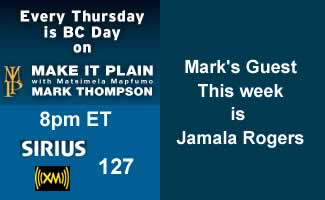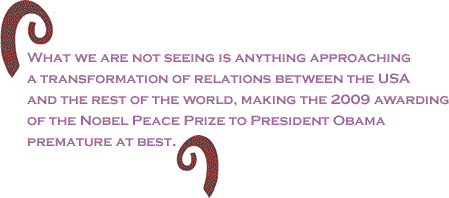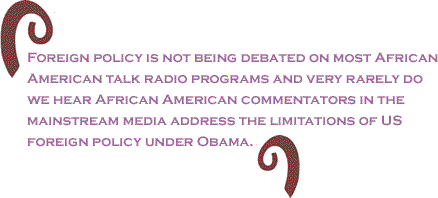| In
the face of the deployment of 100 US troops to Uganda and
the assassination of unindicted accused Al Qaeda operative
and US citizen Anwar al-Awlaki by the Obama administration,
and a clear pattern of increased militarization of U.S.
policy toward Africa there is a serious question to be posed
to Black America: where is the outcry?
It is no rhetorical flourish to say that the foreign policy of
the Obama administration, far from representing a qualitative
break with that of the Bush administration, has proven in
most spheres to be continuity. This in no way means
that the same verbal belligerence is at play. In
fact, the policy is more akin to that followed by former
President Bill Clinton in that there is more of an effort
to collaborate with other imperial allies in our aggression
rather than the unilateralism that was very characteristic
of President George W. Bush. Nevertheless, what
we are not seeing is anything approaching a transformation
of relations between the USA and the rest of the world,
making the 2009 awarding of the Nobel Peace Prize to President
Obama premature at best.

Instead we have seen the escalation of war in Afghanistan to the
point that one can correctly describe it as the Afpak War
(Afghanistan/Pakistan) with the regular drone attacks taking
place in both countries and the increase in terrorist activity
within Pakistan itself, a phenomenon that truly represents
the chickens coming home to roost for US policy. While
we applaud the announced withdrawal of US troops from Iraq,
there is continued saber-rattling towards Iran. Of
course there was the US/NATO intervention in the Libyan
civil war with the hypocritical claim to human rights while
at the same time casting a blind eye to atrocities in the
close US allies like Bahrain. And in the Western
Hemisphere, minute changes in US policy towards Cuba, along
with on-going hostility towards Venezuela and de facto (if
not de jure) support of the 2009 coup in Honduras that overthrew
a democratically elected government. Of course,
to this list we must add Haiti and US efforts that were
undertaken to block the return of deposed President Aristide,
not to mention the abject failure of reconstruction efforts
since the massive earthquake.

Well, this is a partial list, but the point here is that there
is something very wrong in Obama’s foreign policy, yet you
would not know that from Black America’s response. Foreign
policy is not being debated on most African American talk
radio programs and very rarely do we hear African American
commentators in the mainstream media address the limitations
of US foreign policy under Obama. While the Congressional
Black Caucus has increasingly criticized the President around
domestic policies, particularly the need by the administration
to address the economic depression-like conditions of Black
America, there is relative silence on foreign policy.
This relative silence appears to be rooted in the same general
problem that has afflicted Black America since the election
of Obama: a belief that criticism and pressure is somehow
destructive and disloyal. One can only conclude this
in light of the fact that on most foreign policy matters
Black America has shown an historic identification with
the struggles for liberation and independence, especially
in Asia, Africa and Latin America. African Americans were
the most critical demographic segment of the USA when it
came to the US invasion of Iraq, for instance, and we regularly
criticize and openly oppose interventionist activities by
the USA…except when they are carried out by the Obama Administration.
We are not waving our fingers at anyone. Rather we are
suggesting that this is a dangerous course of action because
it represents a failure to recognize that the Obama administration
is not about one individual named Barack Obama. It
is an administration overseeing policies, many historically
rooted, in the objective of building and sustaining global
domination. In other words, this goes way beyond
a question of Obama’s personal views and beliefs and speaks
to the sort of administration that he constructed, including
who were named top officials and who were excluded.
By remaining silent in the face of US aggression (and law violations,
such as the murder of Awlaki and drone attacks that take
the lives of many civilian noncombatants) we are making
several mistakes. For one, we are ignoring the precedent
that is being set. Kill one US citizen without
even an indictment (let alone a trial) and where does it
end? Wave our swords at Iran and promote destabilization,
and does this result in an all-out war? Send
troops to Uganda, and does this become another Vietnam? Cajole
military forces in one African country to invade another?
None of this benefits Black America - not to mention the
rest of the world - in the slightest and under other circumstances
many African Americans would be protesting.

Paradoxically, it is probably time for us to rethink Obama’s remarks
at the Congressional Black Caucus banquet in September. When
he said African Americans needed to stop complaining and
put on our marching boots, many people became upset and
felt insulted. But let’s think about this for
a moment. Too many of us have been content to
complain - sometimes bitterly - in private about what we
fail to see from the Obama administration. So,
maybe it is time to put on those marching boots, indeed,
and march in protest not only against the demonic activities
of the Republicans but as well against US aggression carried
out by the first African American President of the United
States of America?
If not now, when? If not you (us), who?

BlackCommentator.com
Editorial Board member Carl Bloice is a writer in San Francisco,
a member of the National Coordinating Committee of
the Committees of Correspondence for Democracy and Socialism
and formerly worked for a healthcare union. Click here
to contact Mr. Bloice.
BlackCommentator.com
Editorial Board member, Bill Fletcher,
Jr., is a Senior Scholar with the Institute for Policy Studies, the immediate past president
of TransAfricaForum and co-author of
Solidarity Divided: The Crisis in Organized Labor and a New Path
toward Social Justice (University of California Press), which examines the crisis of organized
labor in the USA. Click here
to contact Mr. Fletcher.
BlackCommentator.com Editorial Board member, Jamala Rogers, is the leader
of the Organization
for Black Struggle in St. Louis and the Black Radical Congress
National Organizer. Additionally, she is an Alston-Bannerman
Fellow. She is the author of The Best of the
Way I See It – A Chronicle of Struggle. Click
here to contact Ms. Rogers.
|

